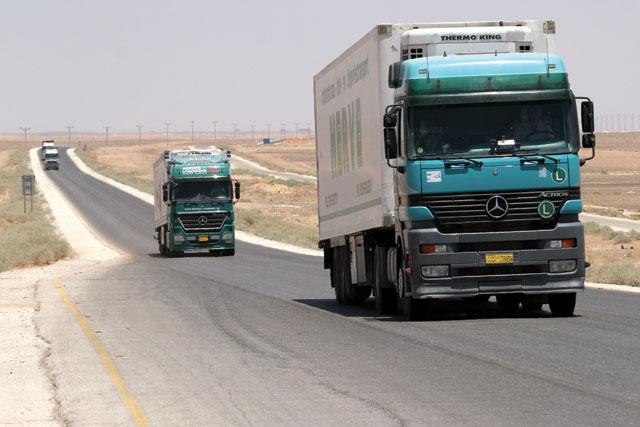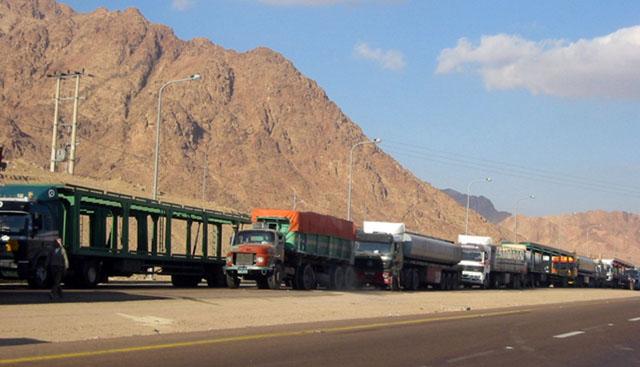You are here
As Iraq chaos deters truckers, Turkish exports suffer
By Reuters - Jul 12,2014 - Last updated at Jul 12,2014
HABUR, Turkey — Abdi Tekin used to spend days waiting to clear this customs post on the border with Iraq, his truck among the hundreds lined up to ferry some $1 billion worth of goods a month to Turkey's second biggest export market.
Now, lying on a thin, dusty carpet in the shade of his cab, he has to wait just a few hours at Habur. Chaos in Iraq, where a bloody Islamist insurgency threatens to dismember the country, has brought one of Turkey's key trade routes to a virtual halt.
"Everything's been different for the past month, month and a half. There are no cargoes or very few... We're racing with each other to get them," said Tekin, 33, as he took a nap to steel himself for a journey he has been making for years, but which in recent weeks has become increasingly treacherous.
Economists expect Turkey's trade balance to take a painful hit after Sunni militants seized swathes of northern and western Iraq last month — including the big northern city of Mosul, a key staging post on Turkey's export route to Baghdad.
Islamist insurgents held 32 Turkish truck drivers there for three weeks last month and still hold dozens of other Turks hostage. Though despite the risks, competition among trucking firms means freight rates have actually come down in many cases.
"The trade has almost stopped," said logistics company owner Kemal Palta, who runs a fleet of 67 trucks from his office in Silopi, close to the Iraqi border crossing at Habur.
"There is no demand. There are no cargoes for our trucks to carry. I saw some experts saying there's been a fall of 20 per cent. If only that was the case," added Palta, who is also a senior official in the local chamber of commerce.
"I'd say there's a fall of at least 60 per cent and it will get worse in July," Palta indicated, a view echoed by the truckers at Habur, so congested just a month ago that they routinely waited in line for up to five days for paperwork to cross into Iraq.
Turkish exports to Iraq fell 21 per cent to $727 million in June, according to data from the Turkish Exporters Association (TIM), but the full extent of the drop-off in trade is only likely to be reflected in the figures over the coming months.
Iraq has risen to become Turkey's second biggest export market after Germany in recent years as the country rebuilds its economy after decades of war and sanctions and Ankara has sought to diversify its trade away from a dependence on Europe.
Exports to Iraq, mostly to the autonomous Kurdish enclave in the north of the country, had been growing in the double digits since 2005, at times in excess of 30 per cent, helping to narrow a trade gap partly responsible for Turkey's big current account deficit, its main economic weakness.
More than $5 billion worth of exports were shipped to Iraq in the first five months, broadly in line with volumes in the same period a year earlier, before the insurgency flared. Food, building materials and refined fuel are among the main products going across the border by road.
Fear and falling profit
Predominantly Sunni Muslim Turkey warned its citizens last month to leave all but autonomous Iraqi Kurdistan, saying "negative propaganda" was being spread against Ankara in the Shiite-dominated south of the country.
Turkey has long had a tense relationship with Iraqi Prime Minister Nouri Al Maliki's Shiite-led government, not least because of Turkey's thickening ties with Kurdistan, which is at odds with the federal government over oil and land rights.
"At least two dozen of my fellow drivers have stayed at home for the past month, because there are no cargoes and because they're scared to death. So am I," said truck driver Muharrem Cinar, 38, splashing bottled water on his face to keep cool under the scorching sun as he waited at Habur.
The truck drivers held in Mosul appeared in good health when they were released and said they had not been mistreated.
But that is little consolation for nervous truckers in Habur, not least as another 49 Turks, many taken from their consulate in Mosul, are still being held.
"I would never go to Mosul, especially after this," said Cinar. "There was always danger, but now it's entirely different. You go there and they might kill you."
Those still willing to venture into Iraq say the fall in demand for their services is eating into their profits.
"Before the war, the price I charged per tonne for this cargo was $55. Now I am carrying this for $28, and I bargained hard," said Mehmet Badur, 44, lighting a cigarette before jumping into his truck laden with sunflower oil.
Alternative routes
Almost all of those still waiting to cross at Habur were travelling to Kurdistan in the north, relatively untouched by the violence of the Islamic State of Iraq and the Levant (ISIL) and its allies as they fight Iraqi government forces.
That has left transport companies looking for alternative routes into the rest of Iraq without having to go through Mosul. But the detours increase the costs. The straight route from Habur to Baghdad via Mosul is about 550 kilometres. A route to the east, avoiding Mosul, is at least 20 per cent longer.
"ISIL's seizure of Mosul cuts our route in two. Now we're trying to go via Iran, but the Iranians want an additional fee," said Palta, the logistics company owner. Another option might be to hand over loads to Iraqi drivers at the Kurdish frontier.
"But," he added, "we have to keep trying as this is our biggest export market."
Iraq accounted for almost 8 per cent of Turkey's $152 billion exports last year and a fall in trade could force it to cut its $166.5 billion target for 2013, economists predict.
Noting that the violence flared only towards the middle of June, Finansbank chief economist Inan Demir said the 21 per cent decline in Turkish exports to Iraq last month reflected problems that were only fully a factor in the latter half.
"The real impact," he noted, "will be seen in July and August and I wouldn't be surprised to see a 40 per cent decline."
Such a decline could arrest the narrowing trend in Turkey's trade deficit, the main driver of its $50 billion current account gap, which both the government and central bank have been struggling to bring down.
The Iraqi glitch for the economy could discomfit Prime Minister Recep Tayyip Erdogan as he bids for the enhanced post of president next month, though few expect it to prevent him winning an election at which polls make him the clear favourite.
Mehmet Buyukeksi, head of the TIM exporters' association, said this month that the situation in Iraq was worrisome but that trade losses would be compensated for by a revival in demand in European markets.
Finansbank's Demir did not agree.
"I don't think a rise in exports to Europe can totally compensate for the fall in exports to Iraq," Demir said. "If official trade data proves the decline to Iraq in coming months, a downward revision of my year-end export forecast is likely."
Such economic calculations are a distant concern for the truckers at Habur.
"Iraq is finished for me," Vehbi Demir, 37, one of the drivers abducted in Mosul, told Reuters after his release. "From now on I will never set foot in that country again."
Related Articles
Lebanon's land exports to Gulf Arab markets have been choked off, leaving millions of dollars in goods stranded after the closure of a vital crossing on the Syrian-Jordanian border last month.
Jordanian truck drivers have quit the "lawless" route inside Iraq as it is controlled not only by the so-called Islamic State (IS) militants but also by other sectarian militias, president of the Jordan Truck Owners Association, Mohammad Dawood, said Thursday.
Jordanian trucks will not be allowed to head to Libya due to security reasons, Jordan Truck Owners Association President Mohammad Dawood said Wednesday.


















